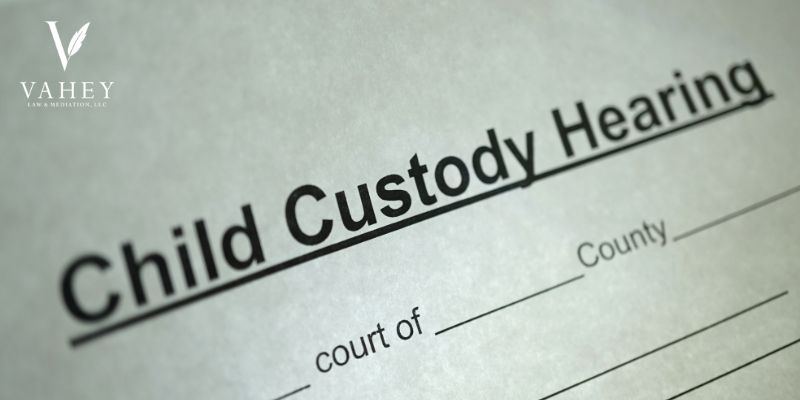Navigating a child custody determination can be a very complicated and even stressful process, whether you are married and going through a complex divorce or are unmarried parents going through a separation. It can be difficult to balance your child’s needs while still respecting the rights and wishes of you and your spouse or the other parent. Enlisting the support of a Naperville child custody attorney can make this process smoother.
At Vahey Law & Mediation, LLC, we can handle the complexities of child custody proceedings with skill and passion. Our client-focused Naperville child custody agreement lawyers aim to secure the fairest and most reasonable outcome following Illinois state laws and the best interests of your child or children.

In Illinois, child custody is determined based on the “best interests of the child" standard. This means that the court will consider various factors to determine what would serve the child’s best interest and well-being. These factors can include the child’s wishes, the physical and mental health of everyone involved, either parent being unfit, the child’s involvement in their home, school, and community, and other relevant factors.
Illinois law does emphasize the importance of both parents being involved in their child’s life, and joint custody arrangements are common. The state uses the term “parental responsibilities” in child custody cases. Parental responsibilities include significant decision-making responsibilities and parenting time.
Parents may share decision-making responsibilities or one parent may be allocated as the sole decision-making authority over choices about the child’s religion, healthcare, education, and extracurricular activities. The allocation of parenting time refers to the schedule detailing when the child will spend time with each parent. This schedule aims to ensure both parents get significant and meaningful time with the child.
Instead of using terms like “custody” and “visitation,” the Illinois Marriage and Dissolution of Marriage Act (IMDMA) allocates specific aspects of parental authority and time spent with the child. The key types of parental responsibilities are separated by sole or joint decision maker, sole or joint parenting time, or a hybrid arrangement.
If one parent is granted the sole decision maker, they have the authority to make the major decisions, such as the child’s education, healthcare, religion, and extracurricular activities. If it is decided that both parents will share the responsibility of making these major decisions, it is called joint decision-making.
Similar to decision-making, parenting time is also granted as to who has sole parenting time or if parenting time is given jointly. In sole parenting time, one parent has the majority of parenting time with the child, and the other parent has a schedule determined by the court. If joint parenting time is decided, both parents share time with the child, and the parenting schedule is worked out based on the child’s best interests.
Not every case can fit into these arrangements and may have a hybrid arrangement. This could be one parent has sole decision-making, but they both have joint parenting time, or they share joint decision-making, but one parent has sole parenting time. Also, in some cases, grandparents or other relatives may seek visitation rights. The court considers what is in the child’s best interest when deciding non-parental visitation.
In child custody cases in Naperville, Illinois, the court considers a range of factors to determine what arrangement is in the best interests of the child as outlined in the IMDMA. Some of the key factors are:
Having an idea of what the future process could look like will help alleviate some of the stress that comes with child custody cases. Although every case is unique and will require different things, there is a general outline for how the case will go. The steps are:
Although this is commonly how Illinois child custody cases proceed, it is important to remember that specific steps and procedures can vary depending on each unique case.
Sometimes circumstances may change, whether that be from medical emergencies, the loss of a job, or an unexpected death; one or both parents may need to adjust an existing child custody order.
In Illinois, a parent seeking a modification to a child custody order must be able to prove that there has been a substantial change in circumstances since the original order. This process is similar to the original process and always considers the child’s best interests when evaluating modification requests.
Seeking legal counsel is the better way to understand the complexities of child custody. Many legal variables can complicate your case, and you don’t need to add more difficulties to an already difficult situation. Hiring the right Naperville Child Custody Lawyer will help you understand the law, objective advice, legal procedures and paperwork, negotiation and mediation, court representation, knowledge of local jurisdiction, and protecting your rights.
This will vary based on several factors, including the complexity of the case and the lawyer’s experience. Legal fees are only one part of the overall cost of the legal proceeding. There may be additional expenses such as court filing fees, expert witness fees, and other related costs.
Who is responsible for the attorney fees can vary depending on the case circumstances and court decisions. Typically, each party is responsible for their attorney fees. However, there are situations where the court may order one party to contribute to or pay the entire amount of the other party's attorney fees. It is recommended that you consult with our Naperville Child Custody Attorney, who can provide you with more detailed information based on the details of your case.
Vahey Law & Mediation, LLC will provide experienced and passionate legal counsel for child custody and family law matters. We will gather everything we can to support your position in child custody court and determine the most effective approach for your case. Contact our Naperville, IL Child Custody attorneys when you are ready to discuss your legal options, and we will help you navigate the complex Illinois court system.